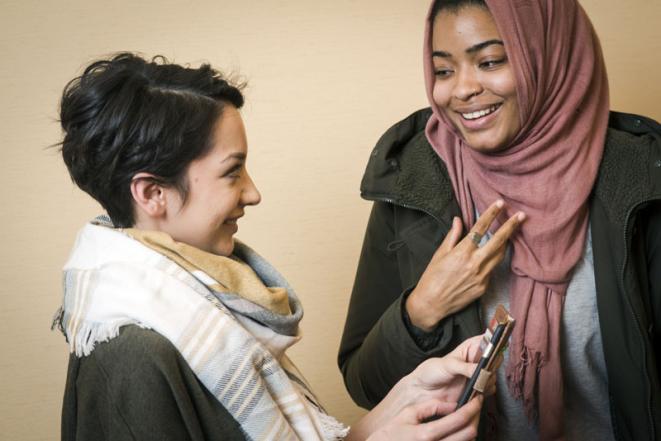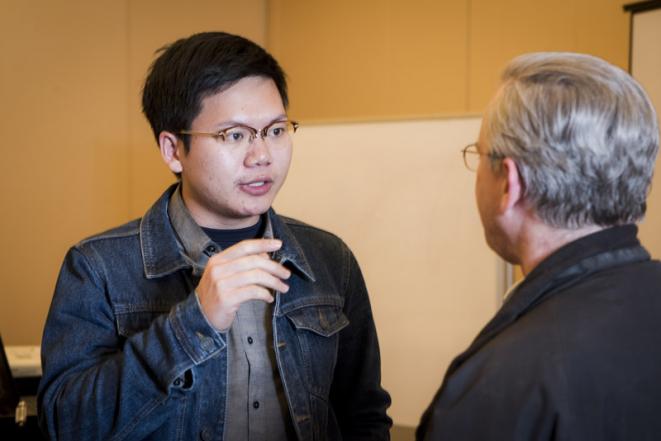Creating dialogues that make a difference
Master of Science, Conflict Analysis and Resolution, 1998, George Mason University
 |
 School for Conflict Analysis and Resolution students join INTO Mason students from around the world to discuss race, religion and the U.S. election. Photo by Evan Cantwell.
School for Conflict Analysis and Resolution students join INTO Mason students from around the world to discuss race, religion and the U.S. election. Photo by Evan Cantwell.
The Dialogue and Difference class at George Mason University is set up so international and American students can explore controversial topics such as politics, race and religion in a safe, nonjudgmental environment.
But when the topic of the hijab came up, Ana Diaz felt tension in the room.
“Some students couldn’t understand how the hijab could work with gender equity or ideas about western feminism,” said Diaz, a senior conflict analysis and resolution major from Fairfax, Va. “Some people had the reaction, ‘Isn’t that offensive to women?’ So I spoke up and said, as a conservative Christian, we are expected to cover our heads in church as well—kind of trying to ease the tension through connecting experiences.”
“That switch to realizing what you can learn from other people is really what underlies dialogue and cross-cultural communications,” said adjunct professor Leila Peterson.
Peterson, in George Mason’s School for Conflict Analysis and Resolution (S-CAR), and Michael Smith, an English language instructor in the INTO Mason program, have run the class for eight years.

INTO student Kevin Zhikuan Lin (left) is one of the students in the Dialogue and Differences class. Photo by Evan Cantwell.
For S-CAR students, it is a crash course in managing difficult discussions. For INTO Mason’s international students, as they transition into the university, the discussions build English language skills and give insight into American culture. That’s important, Peterson said, because “so much of learning language is learning the culture behind the language.”
“All in all, I think [the class] provided an environment in which people can understand each other in a diverse perspective and respectful attitude,” said Kevin Zhikuan Lin, an INTO Mason student from China’s Guangdong province. “It did encourage me to share my opinions confidently. Besides, it gave me an excellent chance to improve my English and recognize American culture.”
The class, offered each fall, took on greater significance given president-elect Donald Trump’s hostile views toward immigrants.
Two days after the election, the subject was up for discussion.
“They did a wonderful job,” Smith said. “They kept it really mellow. In the end, we did a peace circle, and people just started talking about their feelings.”
Class ground rules are created and agreed upon by the students. American students must speak slowly and clearly to accommodate the international students still learning English. The discussions are not debates. Inquiry is stressed, not advocacy. And everyone gets a chance to speak, which means discussions pause every few minutes so those who haven’t spoken can get involved.
“The bottom line is to realize that people are complex and to learn the skill of listening,” Smith said. “The goal of dialogue is not to persuade but to understand. You’re not trying to convince somebody. That’s not the point.”
“It was a good way to challenge my own frame of thought,” Diaz said of the class. “It builds this habit of constructive uncertainty, I guess, where you are willing to question and be uncertain about what you thought you knew.”
This material is presented as the original analysis of analysts at S-CAR and is distributed without profit and for educational purposes. Attribution to the copyright holder is provided whenever available as is a link to the original source. Reproduction of copyrighted material is subject to the requirements of the copyright owner. Visit the original source of this material to determine restrictions before reproducing it. To request the alteration or removal of this material please email [email protected].
rosters
IMPORTANT LINKS
- Home
- Admissions
- Academics
- Research & Practice
- Center for Peacemaking Practice
- Center for the Study of Gender and Conflict
- Center for the Study of Narrative and Conflict Resolution
- Center for World Religions, Diplomacy, and Conflict Resolution
- Indonesia - U.S. Youth Leadership Program
- Dialogue and Difference
- Insight Conflict Resolution Program
- Parents of the Field Project
- Program on History, Memory, and Conflict
- Project on Contentious Politics
- Sudan Task Group
- Undergraduate Experiential Learning Project
- Zones of Peace Survey
- News & Events
- Student and Career Services
- Alumni
- Giving




